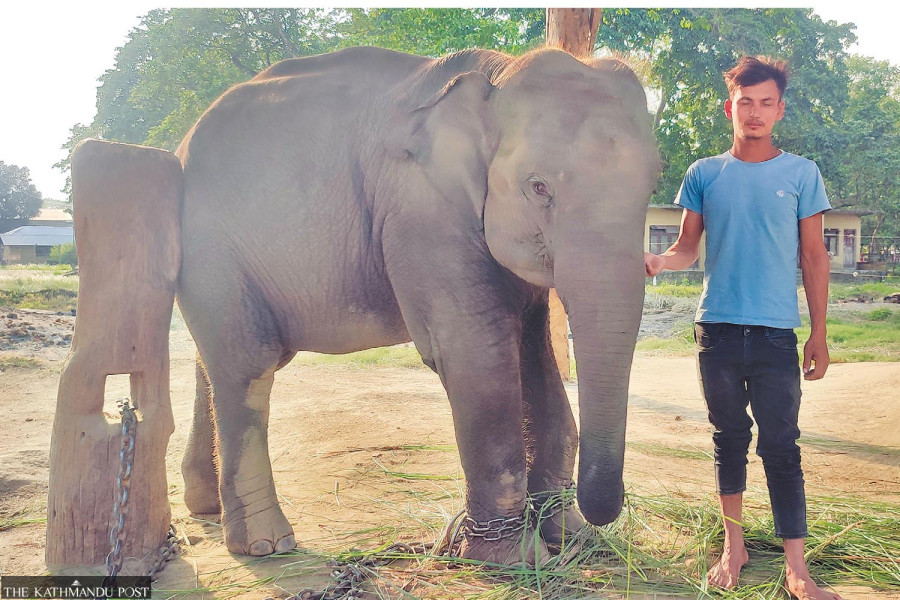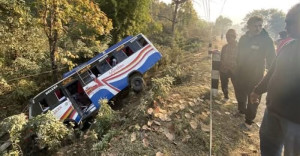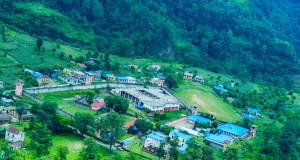Bagmati Province
Tuskers Rudrakali and Khagendraprasad delayed in their journey to Qatar
Nepal and Qatar await approval from CITES headquarters in Geneva as elephants are protected under the convention.
Ramesh Kumar Paudel
Two elephant calves named Rudrakali and Khagendraprasad stole limelight during the two-day state visit of Emir of Qatar Sheikh Tamim bin Hamad Al-Thani to Nepal in April. The two pachyderms bred at Elephant Breeding Centre in Khorsor, Sauraha, drew people’s attention as Nepal decided to gift them to the Qatari emir.
However, Rudrakali and Khagendraprasad are still in Chitwan, with no set date for their departure to Qatar. The Chitwan National Park picked Rudrakali and Khagendraprasad after the government asked the park authorities to make necessary preparations to gift two elephants to Qatar.
“We selected two elephants for a gift as requested. The national park is all prepared to send the elephants to Qatar once the Department of National Parks and Wildlife Conservation instructs,” said Ganesh Prasad Tiwari, information officer at the Chitwan National Park.
Rudrakali and Khagendraprasad are now at the breeding centre in Khorsor. According to the Chitwan National Park, Rudrakali is a female elephant aged six years and nine months while Khagendraprasad is a five years and 10 months old male. According to park officials, male elephants are traditionally given ‘Gaja’ [meaning elephant in Sanskrit] or ‘Prasad’ [divine offering or blessing] as their second names while ‘Kali’ or ‘Mala’ are added to the names of female elephants.
According to senior ecologist Shyam Kumar Sah, who is the information officer at the Department of National Parks and Wildlife Conservation, some procedures are yet to be completed before Rudrakali and Khagendraprasad can be sent to Qatar.
Since elephants are protected under the Convention on International Trade in Endangered Species of Wild Fauna and Flora [CITES], they cannot be sent to another country without prior approval from CITES headquarters in Geneva, Switzerland.
“Some procedures are underway to receive approval from CITES. The Nepal government will make the decision and arrange for the elephants to be sent to Qatar,” said Sah.
As per CITES rules, Qatar must commit to provide the elephants a suitable habitat and regularly provide health details about them to Nepal. “It has been around three months since I wrote to Qatar regarding the matter. We expect to receive commitments on these two issues soon,” said Sah.

Qatar is a Gulf country in the western Asia and has a hotter climate than Nepal. Conservationists and ecologists suggest that sending elephants to Qatar is not quite suitable in summer. “We are thinking about sending them in winter,” said Sah.
As per the records available at the elephant breeding centre in Khorsor, Rudrakali was born on October 9, 2018 while Khagendraprasad was born on September 25, 2019. The employees at the breeding centre start training the calves after they attain two and a half years of age. Both Rudrakali and Khagendraprasad are already trained elephants.
“One should be careful about the age of wildlife while picking them to send abroad. Too young elephants should not be sent while it is difficult for old ones to adapt in the new environment. Rudrakali and Khagendraprasad meet the required criteria so they have been chosen,” said Tiwari. According to him, government officers from Qatar visited Chitwan National Park twice to inquire about Rudrakali and Khagendraprasad.
A Nepali team led by senior veterinarian Dr Bijay Shrestha also visited Qatar a few months ago to assess the environment where the elephants will be kept. Both Nepali and Qatari teams, according to Tiwari, have come to the conclusion that Rudrakali and Khagendraprasad can be sent to Qatar.
According to the employees at the elephant breeding centre in Khorsor, a month-long training is provided to the elephants. Then their activities are monitored under the supervision of a mahout, a keeper and driver of an elephant. Captive elephants only follow their mahout's instructions. So the preparations are on to send the mahouts of both the elephants to Qatar.
Earlier Nepal used to send only rhinos, crocodiles and other animals as gifts to other countries. Nepal has already gifted 26 rhinos as presents to various countries.




 22.6°C Kathmandu
22.6°C Kathmandu1.jpg)















